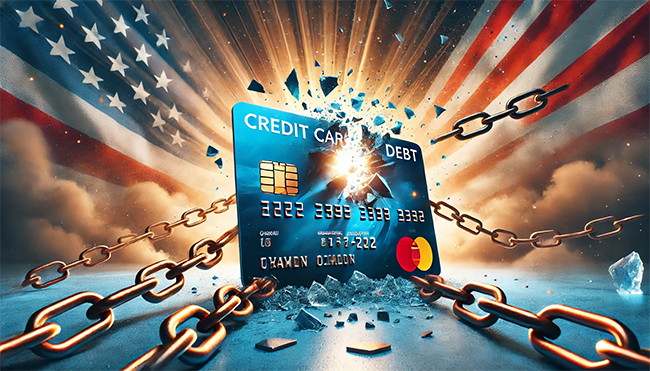
In a world dominated by credit, it’s easy to forget that true wealth was once measured in tangible assets like gold and silver. Over time, the Federal Reserve and central banks replaced “real money” with fiat currencies—money not backed by physical assets, but by government trust. Today, the U.S. dollar and other currencies are essentially credit. Each dollar spent adds to the national debt, perpetuating a cycle of credit dependency that affects economies worldwide.
For individuals, the chains of credit are glaring. From credit cards to student loans and mortgages, many are trapped in a cycle of borrowing just to keep up with living expenses. In developing countries, entire economies rely on credit. In these cases, credit isn’t just a tool—it’s a lifeline.
The “buy now, pay later” mentality is deeply embedded in society, but it often leads to overwhelming debt. U.S. credit card companies frequently charge interest rates upwards of 21.5 percent or even 29 percent, leaving consumers struggling to pay both principal and interest. Proposals like capping interest rates at 10 percent, as suggested by former President Donald Trump, could offer some relief, but they don’t address the deeper issue—our dependence on credit.
Trump’s proposal targets credit card rates specifically, but it doesn’t fix the broader problem of credit addiction. Lowering interest rates would relieve some financial pressure, but it won’t change the structural forces that drive borrowing.
Some argue that capping rates could have unintended consequences, like banks limiting credit for high-risk borrowers or raising other fees. This might push consumers toward worse options, like payday loans. Credit, after all, is both a tool for growth and an instrument of exploitation. For many, borrowing is not a choice, but a necessity.
Is Trump’s suggestion revolutionary? In part, yes. It challenges the ability of credit card companies to profit from high rates. But lowering rates only addresses symptoms, not the root cause of credit dependency. Credit isn’t just about interest rates—it’s about how we use and rely on it.
Trump’s approach is making headlines, coming from a man often criticized as a capitalist protecting corporations over everyday people. However, it was recently reported that he offered permanent residence to undocumented immigrants who graduate with at least a two-year college education, adding complexity to the image of a man typically associated with big business over social causes. Trump’s proposal to cap credit card interest rates even earned an unexpected ally: socialist Bernie Sanders, who expressed a willingness to work with Trump on this issue.
This system isn’t inevitable. It’s time to rethink banking and credit. If private banks won’t reform, governments must step in with limited intervention to protect consumers. This is not advocating for socialism, but for state involvement to ensure that credit serves as a tool for empowerment, not exploitation. The government already manages systems like student loans—why not extend this model to other areas of personal finance? A government-backed credit system could offer low-interest loans, bypassing banks and easing financial strain.
However, if government intervention is a “curse word” due to fears of socialism, then banks should take the lead by reducing credit card interest rates to a maximum of 10 percent. They would still make billions in profits, without trapping consumers in a cycle of debt.
Such reforms would allow responsible borrowing without the burden of high interest and endless debt. Government involvement need not undermine capitalism; it should fill the gap where the private sector has failed. The goal is to offer a fair alternative, not replace free enterprise but protect individuals from financial exploitation.
This model could also benefit developing nations, where affordable credit is scarce. Low-interest loans could empower entrepreneurs and boost local economies, fostering growth and reducing dependency on predatory lending. It would promote a more equitable global economy while maintaining the principles of free markets.
The current system, where banks hold the power, is unsustainable. Credit has shifted from a tool for growth to a method of exploitation. If banks won’t change, the government must step in with limited intervention, ensuring that credit works for people, not against them. It’s time to break the chains of credit slavery and create a system that empowers consumers. The moment for change is now.



